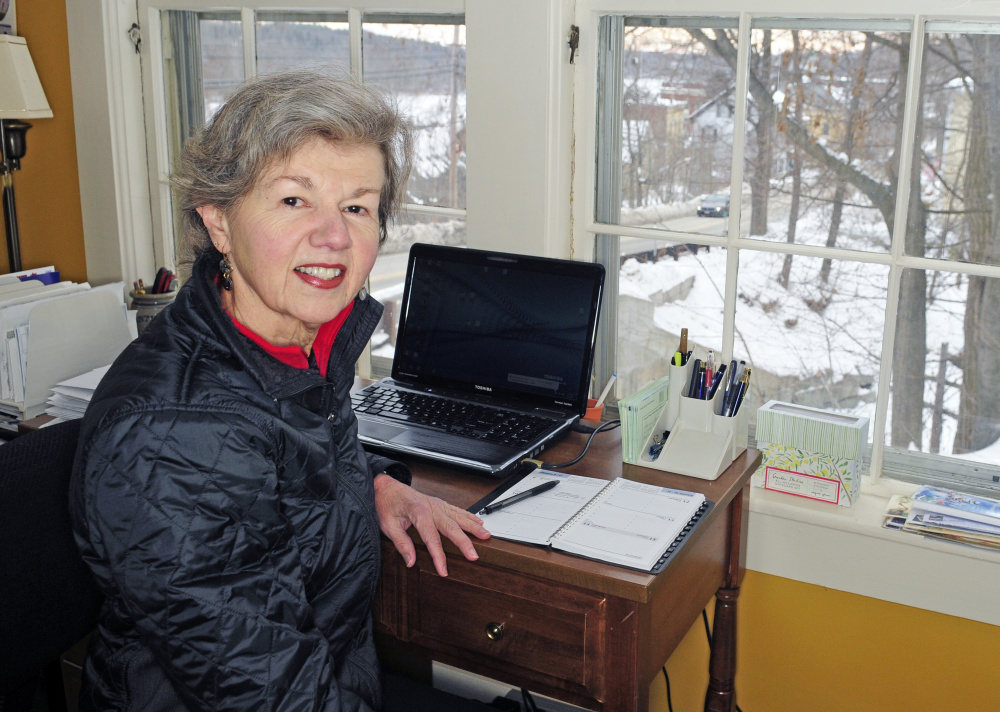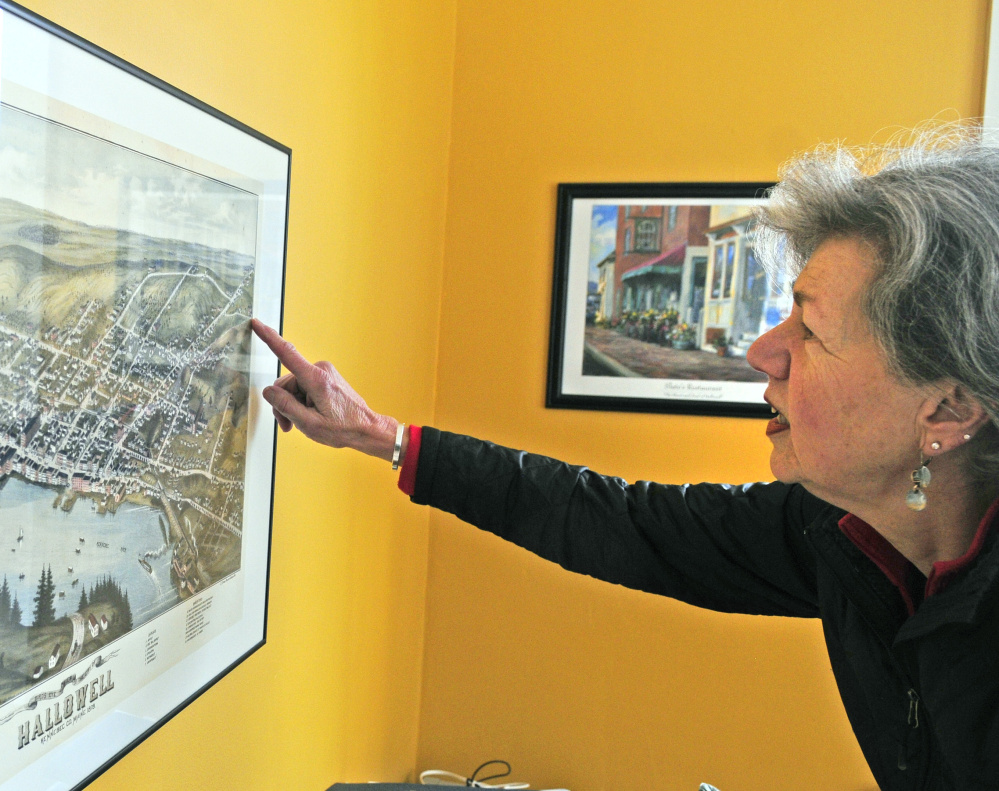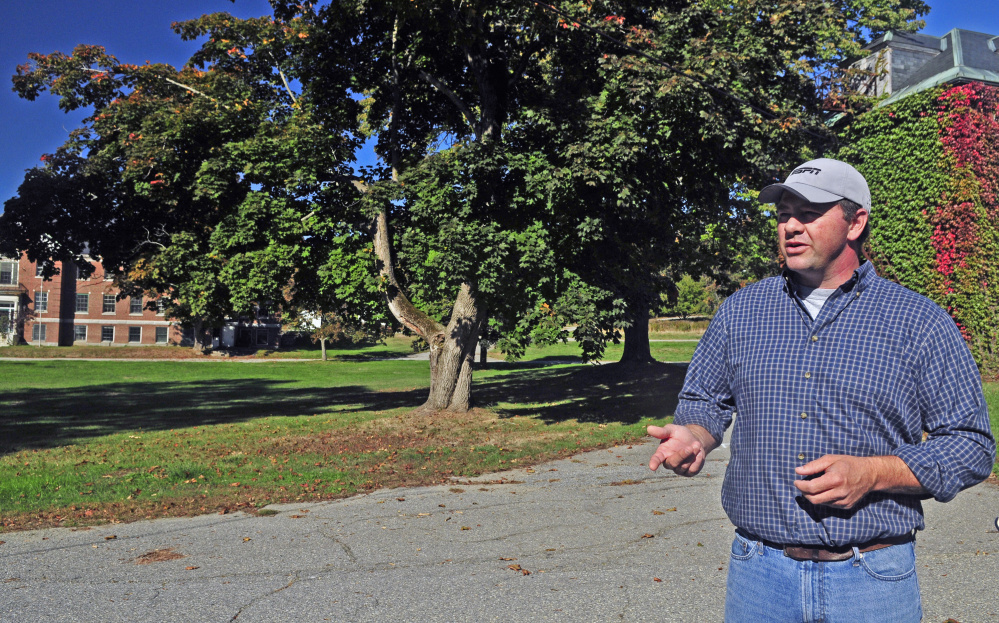Patricia Connors doesn’t think investing $600,000 of public money into the private Stevens Commons development is a risk Hallowell should take, and she sent out a mailer this week in the hope that other people agree.
Connors, 73, moved to Hallowell about five years ago from Manchester and doesn’t agree with calling the Stevens Commons project a public-private partnership.
Developer Matt Morrill acquired the 54-acre campus from the state in April for $215,000. His vision for the campus is a mixed-use development including affordable senior housing, commercial and retail space, and small, clustered subdivisions. To help make that happen, he’s asking the City Council — and ultimately voters — to approve a $600,000 bond to improve city-owned roads that run through the campus. The bond would be paid back over 20 years, but the city has yet to finalize the interest rate or what the overall cost would be.
The city is considering a package of bonds totaling $2.45 million to pay the city’s share of Water Street reconstruction, Stevens Commons, purchasing property for parking and other projects. Officials have yet to decide whether the bonds — if approved by the City Council — would appear on a ballot as one big package or smaller questions specific to each project.
Connors said she favors redevelopment of the former Stevens School property, which was built in the late 1800s as a boarding school for girls, but she said Morrill is going about it the wrong way.
“He’s asking for public money that would be gifted to him, taxpayer money,” Connors said by phone Friday.
But Morrill, members of the city’s finance committee and City Manager Nate Rudy all said the money would go toward infrastructure improvements to roads and sidewalks within Stevens Commons, improvements that would make the campus attractive to other developers.
“I’m not asking the city to give me money, but to invest in improvements to the roads that will be owned by Hallowell,” Morrill said by email Friday.
Morrill said the city would pay the contractors directly and none of the money would go directly to him.
Connors said she spent nearly $600 to send a mailer to every registered address in Hallowell. The postcard says “Hallowell Taxpayers: Every One of You Is About To Give Stevens School Private Developer Matthew Morrill $1,067 of YOUR OWN MONEY FOR HIS OWN PERSONAL GAIN.”
She said the City Council is rushing to judgment on the redevelopment and is going to “hide a $600,000 bond to benefit Morrill within the Water Street reconstruction bond” and wants people to come to Monday’s council meeting to help her “stop this.” The council meeting is scheduled to begin at 6 p.m. as a joint meeting with the Planning Board as the next step in the Stevens Commons master plan review process. The council will discuss the bond proposal later Monday during its regular meeting.
Connors said she arrived at the $1,067 figure by taking the $600,000 Morrill is requesting and adding the nearly $250,000 he already has received in a forgivable block grant loan. She then used a formula over 20 years and included interest. Each Hallowell taxpayer would see an increase of about $53 per year for 20 years to pay for the bond, though Connors’ mailer didn’t say that directly.
“This money is a gift, so why would we give a private investor a gift?” Connors said. “Why should we be paying for infrastructure improvements to a private development?”
A “myth-busting” document provided to the Kennebec Journal says that before any money would be spent, the city would receive a deed to the roads and rights of way, guaranteeing public access from Winthrop Street through the campus to access over 20 acres of conservation land. The document also says the bond allocation is no different than any other in that public money is being spent on public roads and public infrastructure designed to serve all residents and business owners.
Morrill, of Grand View Log and Timber Frames in Winthrop, and his team say the bond would add $19 in annual property tax per $100,000 of valuation in the first year, $5 the second year and may reduce property tax costs in year three.
Connors said she also is concerned because she doesn’t know how much Morrill has contributed or is willing to contribute to the redevelopment, so she is calling for more transparency. She wonders how something can be called a partnership when only one side shows its cards.
“My question is, how much has the developer put into the project?” Connors said. “He wants to keep calling it a public-private partnership, but I just don’t see it that way at all.”
Morrill said his company, Mastway Development, already has made a substantial investment above the purchase price of the campus, but he declined to provide specific financial data. He said the entire build-out of the plan for the campus is nearly $20 million, which is a big reason why he is seeking other developers to participate.
“The improvement to the road infrastructure is necessary if Hallowell is ever going to see this campus revitalized, whether by me or somebody else,” Morrill said. “It gets a developer to a starting point to begin redevelopment of the several neglected historic buildings on campus.”
When Morrill purchased the property in April, it marked the end of a decadelong endeavor by the state to sell the campus, much of which had fallen into disrepair in recent years. The state first listed the property for $1.1 million in 2008, but there were no takers. Various reports over the past few years mentioned the presence of the Central Maine Pre-Release Center as a turn-off for potential buyers, but that facility closed in 2013.
Ultimately, Connors just doesn’t think the investment by the city is worth the risk if Morrill is unable to turn the property into the mixed-use centerpiece development he proposed. She thinks the council and other city officials are rushing to make the decision and she doesn’t understand why.
“I think it’s too big a risk for us as taxpayers, and that is why I feel so strongly about it,” she said. “There are just too many red flags, and I don’t see the need for rushing into this without looking at it and investigating further.”
Rudy disagrees and thinks there have been ample opportunities for public discussion and comment during numerous City Council, Planning Board and finance committee meetings.
“We really need to focus on all of us being on the same page about the cost and the benefits of the investment being proposed,” Rudy said. “I respect everyone who gets involved in the public process, and I would love for them to all come out to the meetings so they can be informed.”
A lot of Connors’ facts and numbers aren’t accurate, Rudy said, and that concerns him because some people may get their information only from Connors’ mailer, and that would be troubling.
“Unfortunately, there are people who can’t make it out to the meetings, so this is the only information they’ll get,” the city manager said. “I hope that folks can get the right information so that if it comes to a vote, everybody will decide based on a full understanding of the facts.”
Morrill wants to make sure everyone knows how important this project is to him and to the future of Hallowell. He said he appreciates the criticism, adding that all the support he has received puts everything into perspective.
“Hallowell is an engaged community, and we are committed to cultivating community through conservation, restoration and partnership,” he said.
Jason Pafundi — 621-5663
Twitter: @jasonpafundiKJ
Send questions/comments to the editors.







Comments are no longer available on this story